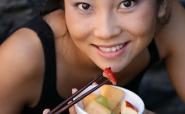Advertisement
Featured article
Diet tips from Japan
Eating advice from the East

Among research that looks at why some people seem to live longer and stay healthier, studies have focused on the Japanese people and, particularly those living in Okinawa, an island in the southernmost region of Japan. The theory that has been put forward for this nation’s longevity is their diet and their mindset.
Japanese have a saying which is ‘Hara hachi bu’ or eat until you are 80% full. In the West we have become accustomed to eating until we’re full, maybe even saving a little space for dessert simply because it’s what we expect or we like to be full. Some of us have been brought up to eat everything on the plate and we pass this advice onto our children. Mothers of babies and toddlers have moods that correlate with their child’s good or bad eating days. Can we ever forget the Monty Python sketch in which John Cleese coaxes his customer to have just one more bite? To eat until you’re not full is almost unheard of to most Westerners. And yet, this is what is practiced in Japan.
Eating begins in the mind. Even if you are cooking for one or two, it doesn’t mean you have to finish it all in the same meal. This is why eating from the saucepan or eating standing up in the kitchen is frowned upon. Deal out a portion on your plate and, after eating, wait. If you’re used to shoveling in food like it’s your last meal, you will need to wait to allow messages between your stomach and your brain to catch up. If you practise doing this, you’ll find you start to realise before you become full and you can then decide if you want to stop there. Hara hachi bu.
article continuedAdvertisement
If you haven’t read Naomi Noriyama's book ‘Why Japanese Women don’t get Old or Fat’ it is a fascinating read. She delves into the culture and history of the Japanese people, giving evidence as to their slower ageing process and low obese figures. Naomi tells the story of how, as an exchange student at an American University, her weight ballooned but on returning back home to Japan it dropped off. She opens the doors to the Japanese kitchen and eating habits. Yes, they eat rice and wheat but also a vast array of fruits, vegetables, unprocessed food and very few ‘empty’ foods that offer no nutrition.
Recipes from her mother’s kitchen are generously dispensed along with arguments and stories as to why they work to keep the Japanese young-looking and long-lived. People always assumed that it was genes that kept Oriental people slim. When the Atkins diet became popular and rice was seen as a high cholesterol food to avoid, I did wonder how it was that rice was the staple for centuries for millions of Oriental people and now it was seen as an undesirable food that made you fat! However, Naomi gives you the benefits of brown over white rice, with an historical tale providing the backdrop and piquing your interest. She explains the understated power of cruciferous vegetables, seaweed soups and the humble egg. All this you are encouraged to introduce into your diet in the simplest home-cooked way, with not a raw fish in sight!
About the Author
Doreen has had a passion for massage since she was 15 years old. She still has that passion, and offers massage, specialist facials and other beauty treatments in her home-based salon in Surrey. With any energy left over she will devour all the beauty pages of all the magazines she can lay her hands on!
Doreen's homepage: Bellessence
Got something to say?
We are looking for authors! Submit an article.
Related articles
Choosing the right exercise program
Walking, aerobics, weights - so much to pick from
Review: Dancing with the Stars - Cardio Dance
An aerobic alternative with the stars from TV
Slimming pills - the alternatives
A guide to weight loss options in a capsule
Top Stories
Beating hayfever with supplements
Some nutritional ideas to beat the seasonal sneezing
Review: Rimmel Eye Magnifier Eye Opening Mascara
A mascara that feels great but is a pain to apply
Beauty through the ages - what comes next?
A look at where current beauty trends may go in the 21st century
Comments
Add your comment